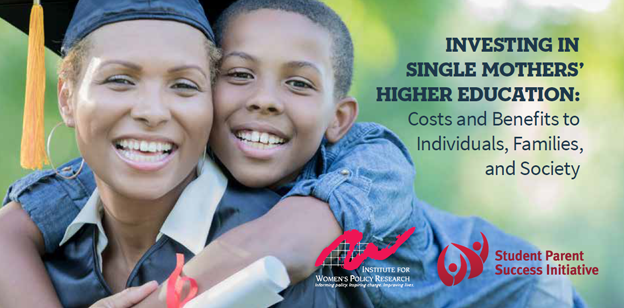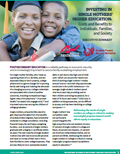College Degrees Bring Significant Benefits to Single Mothers and Society
June 05, 2018
By the Institute for Women’s Policy Research

Single mothers who complete a bachelor’s degree earn $610,300 more over their lifetimes and are 69 percent less likely to live in poverty than single mothers with only high school diplomas, according to an analysis quantifying the economic returns on college attainment for single mothers, by the Institute for Women’s Policy Research (IWPR). Completing an associate degree would also lead to significant gains in earnings and reduced poverty.
The analysis, which is the first of its kind, finds that public or institutional investments in services, such as child care and case management, boost graduation rates and lead to increased lifetime earnings and lower poverty for single mothers who graduate, more than paying for themselves through higher tax contributions and savings on public benefits if single mothers complete their degrees. Single mothers’ own investments in college pay off when they graduate, yielding $8.50-$16.50 in lifetime earnings for every dollar they invest in their own educations.
There were 1.3 million single mothers enrolled at two- and four-year institutions in the 2011-12 academic year. Single mothers in college are disproportionately likely to be women of color, with Black and Native American women more than twice as likely as White women to be balancing school and parenting. Despite the growth in enrollment, just 8 percent of single mothers in college graduate with a degree, reflecting substantial obstacles to college completion, including financial insecurity and caregiving burdens.
IWPR estimates that at current rates of completion, single mothers enrolled in college in 2011-12 who graduate with degrees will contribute $7.8 billion more in taxes over their lifetimes than had they only earned high school diplomas. In addition, 24,300 fewer single mothers would receive public benefits, saving a total of $309 million dollars in public benefits spending in the four years following graduation.
For single mothers who graduate these contributions would more than cover the estimated costs of supportive services, including child care, case management, and financial aid, that help them complete college. Since not all single mothers graduate, however, institutions must focus actively on increasing their completion to ensure that investments in their success pay off.
The paper concludes with policy recommendations for supporting single mothers’ college success, including improving state child care subsidy eligibility rules, exploring more opportunities to integrate early care and higher education systems, and making campuses more family friendly, among others.
READ THE FULL REPORT
The groundbreaking study was supported by the ECMC Foundation, with additional publication support from the Jewish Foundation for Education of Women. Additional information on the project can be found here.
 |
Download: Investing in Single Mothers' Higher Education: Costs and Benefits to Individuals, Families and Society. > |
